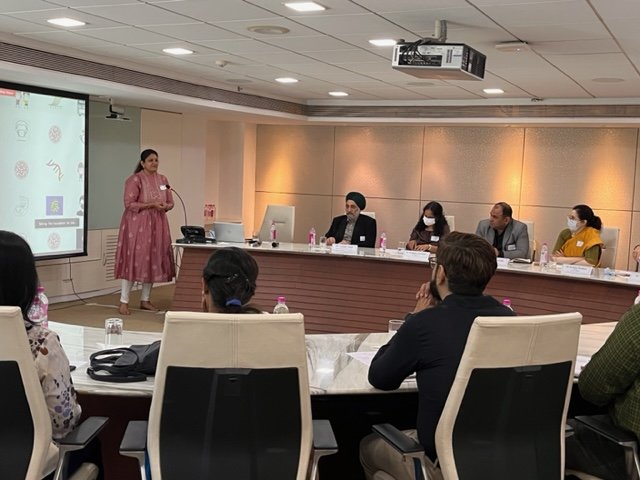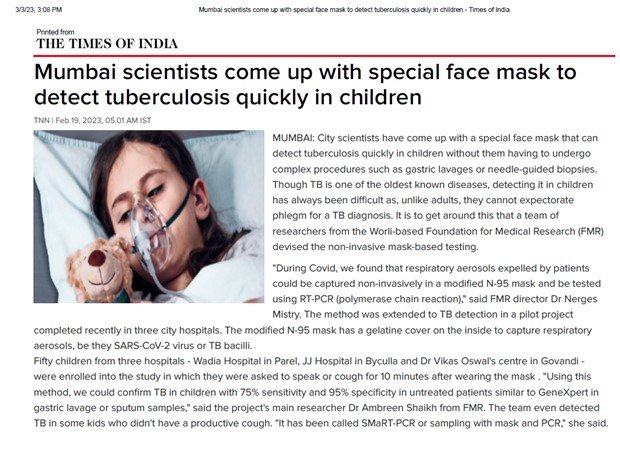|
Women in Science Mentoring Program (2020)
Sampling with Mask and Reverse Transcriptase (SMaRT)-PCR for diagnosis of pediatric tuberculosis
PI: Ambreen Shaikh, The Foundation for Medical Research, India
Project Dates: March 2022 - February 2023
Project Overview
 | | Project dissemination meeting. February 2023 |  | | Newspaper article highlighting the study's findings, February 2023 |
Despite efforts to eradicate tuberculosis, a 56% gap exists in India between the estimated 0.34 million cases of TB in children and the 0.15 million cases reported each year, hampering elimination efforts. The difficulty in diagnosing TB in children is one of the main reasons for the large gaps in notification. A reliable diagnosis frequently necessitates the use of invasive sample collection methods and advanced facilities. Most children with tuberculosis in India do not have access to these methods, resulting in fewer than 20% of the children having microbiological confirmation of the disease, and majority of children are initiated on treatment based on a clinical diagnosis. All of this, results in severe over/under diagnosis and mortality. A non-sputum-based, child-friendly diagnosis tool that can provide equitable access to all children is on the WHO and India's national tuberculosis elimination program's roadmap for tackling TB in children. Final Summary of Project Activities
Through this project, the team developed a simplified non-invasive sampling based scalable diagnostic workflow (SMaRT-PCR) that can be adapted in a hub-and-spoke model of testing with the potential to provide equitable access and address the diagnostic gaps in pediatric TB. Their improved SMaRT-PCR workflow now combines simple, non-invasive sample collection with optimized sample storage and transport conditions, allowing for sample collection even in remote locations with limited resources. Following sample collection, the sample processing protocol has been simplified and works efficiently with low bacterial load samples, making it best suited for samples obtained from children with paucibacillary TB disease. Finally, the project team developed a sensitive molecular test for the microbiological diagnosis of pulmonary tuberculosis in children akin to COVID-19 RT-PCRs routinely carried out in current times and hence can be used in RT-PCR laboratories established at the district level as part of COVID-19 control efforts. Aside from being non-invasive, this method (SMaRT-PCR) would also allow for drug resistance testing to diagnose MDR-TB, allowing children to begin appropriate treatment. The use of a refined SMaRT-PCR workflow for children could aid in the early diagnosis of tuberculosis, reduce reliance on clinical diagnosis, and possibly improve TB detection rates. It could pave the way for earlier and better disease management, as well as a reduction in overall incidence, a critical step towards India's TB elimination goal of 2025. In terms of impact, according to the PI, this PEER seed grant was a bridge between the pilot studies and the planned multi-site SMaRT-PCR workflow studies. In the pilot investigations, the team examined the feasibility of collecting samples from a small subset of patients in a controlled environment at a handful of tertiary care centers. To implement the SMaRT-PCR method in clinical and programme settings, more study and test development were required, which included point-of-care sample collection, building a scalable workflow, and having a drug resistance determination assay. With the help of the PEER seed grant, the team were able to address all of these issues and develop a more efficient SMaRT-PCR methodology, which is now ready for large-scale field testing in an envisioned hub and spoke system. From the research perspective, the most significant results of the seed grant were the development of a single-step multiplex RT-PCR assay for simultaneous TB detection and resistance determination, and the optimization of sample transit and storage conditions. The PEER seed grant also included a component for the PIs' professional growth and mentoring of other junior female researchers in the organization. Using a variety of mentoring initiatives, the project team were able to help upskill the junior women researchers on the project and in the organization The mentees gained knowledge on topics such as self-improvement, teamwork, communicating scientific findings, expanding research interests, and striking a work-life balance. The seed fund also helped the team reach out to new audiences and set up crucial early encounters with potential collaborators who will be vital in taking the project to the next level. From a professional standpoint, the project has given both PIs the opportunity to gain expertise, and expand their knowledge of the field, and facilitate the transfer of knowledge via mentoring. This study's results were disseminated to local, state, and national pediatric TB stakeholders on February 18th, 2023, in Mumbai. The findings were also presented at two national conferences: (1) India TB summit which was held on 12-13th March 2022; (2) National conference for Fostering Partnerships to End Tuberculosis, which was held on March 18, 2023, in Vadodara, Gujarat, and was attended by senior USAID India staff, state and district TB officers from Gujarat and Madhya Pradesh, as well as representatives from the corporate sector who are part of the corporate TB pledge.
|
|
|
|





